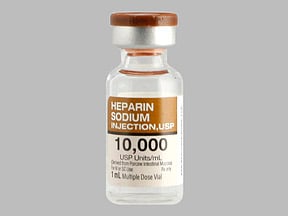
Heparin Sodium (porcine) Coupons & Savings Card – Discount Prices from $3.19
Heparin is a medication designed to prevent and treat blood clots, particularly in the lungs and legs, and is often prescribed for patients with atrial fibrillation. It is also used to address specific blood clotting disorders and to prevent clots following surgery, during dialysis, blood transfusions, blood sample collection, or when a person is immobile for extended periods. Heparin functions as an anticoagulant by enhancing the effectiveness of your body's natural anti-clotting proteins, ensuring smooth blood flow.
Our coupons are free to use. Before paying, show the pharmacist your Heparin Sodium (porcine) savings card to get your free discount. Use our filters below to edit the prescription box to match your needs. The Heparin Sodium (porcine) prices will update based on your prescription needs. Above our Heparin Sodium (porcine) coupons, you can change your location to see pharmacy prices and costs in other areas. We're here to help you buy Heparin Sodium (porcine) at the lowest price with our prescription discount card.
My prescription
Edit
1ML of 10000UNIT/ML, Heparin Sodium (porcine) (1 Vial)
Select pharmacy

CVS
$22.84
COUPON PRICE
Walmart
$3.19
COUPON PRICE
Walgreens
$4.47
COUPON PRICE
Albertsons
$5.93
COUPON PRICEHeparin Sodium (porcine) savings card
Show this card to your pharmacist
Walmart
$3.19
BIN
ID
PCN
GRP
019876
LHCC8FD81B
CHIPPO
LHX
Powered by
Heparin is a medication designed to prevent and treat blood clots, particularly in the lungs and legs, and is often prescribed for patients with atrial fibrillation. It is also used to address specific blood clotting disorders and to prevent clots following surgery, during dialysis, blood transfusions, blood sample collection, or when a person is immobile for extended periods. Heparin functions as an anticoagulant by enhancing the effectiveness of your body's natural anti-clotting proteins, ensuring smooth blood flow.
Our coupons are free to use. Before paying, show the pharmacist your Heparin Sodium (porcine) savings card to get your free discount. Use our filters below to edit the prescription box to match your needs. The Heparin Sodium (porcine) prices will update based on your prescription needs. Above our Heparin Sodium (porcine) coupons, you can change your location to see pharmacy prices and costs in other areas. We're here to help you buy Heparin Sodium (porcine) at the lowest price with our prescription discount card.
Heparin Sodium (porcine) +rfid (Heparin Sodium (porcine)) dosage forms
Use our Heparin Sodium (porcine) +rfid (Heparin Sodium (porcine)) 1ML of 10000UNIT/ML coupon with prices from $3.19 for 1 Vial. You can also use our Heparin Sodium (porcine) +rfid (Heparin Sodium (porcine)) 1ML of 1000UNIT/ML coupon with prices from $1.01 for 1 Vial. We have a Heparin Sodium (porcine) +rfid (Heparin Sodium (porcine)) 1ML of 1000UNIT/ML coupon with prices from $1.01 for 2 Vials. You can use our Heparin Sodium (porcine) +rfid (Heparin Sodium (porcine)) 1ML of 1000UNIT/ML coupon with prices from $1.01 for 3 Vials.
Dosage Quantity Price from Per unit 1ML of 10000UNIT/ML 1 Vial $3.19 $3.19 1ML of 1000UNIT/ML 1 Vial $1.01 $1.01 1ML of 1000UNIT/ML 2 Vials $1.01 $0.51 1ML of 1000UNIT/ML 3 Vials $1.01 $0.34 1ML of 5000UNIT/ML 1 Vial $1.01 $1.01 1ML of 5000UNIT/ML 2 Vials $1.01 $0.51 1ML of 5000UNIT/ML 3 Vials $1.01 $0.34 1ML of 10000UNIT/ML 2 Vials $8.92 $4.46 1ML of 10000UNIT/ML 3 Vials $9.63 $3.21 1ML of 20000UNIT/ML 1 Vial $8.86 $8.86
| Dosage | Quantity | Price from | Per unit |
|---|---|---|---|
| 1ML of 10000UNIT/ML | 1 Vial | $3.19 | $3.19 |
| 1ML of 1000UNIT/ML | 1 Vial | $1.01 | $1.01 |
| 1ML of 1000UNIT/ML | 2 Vials | $1.01 | $0.51 |
| 1ML of 1000UNIT/ML | 3 Vials | $1.01 | $0.34 |
| 1ML of 5000UNIT/ML | 1 Vial | $1.01 | $1.01 |
| 1ML of 5000UNIT/ML | 2 Vials | $1.01 | $0.51 |
| 1ML of 5000UNIT/ML | 3 Vials | $1.01 | $0.34 |
| 1ML of 10000UNIT/ML | 2 Vials | $8.92 | $4.46 |
| 1ML of 10000UNIT/ML | 3 Vials | $9.63 | $3.21 |
| 1ML of 20000UNIT/ML | 1 Vial | $8.86 | $8.86 |
| 1ML of 20000UNIT/ML | 2 Vials | $13.28 | $6.64 |
| 1ML of 20000UNIT/ML | 3 Vials | $16.17 | $5.39 |
